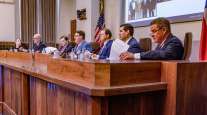The Second Battle of Interstate 81
Back in 2003, Virginia began its ill-advised drive to toll an existing federal highway to raise money for road work, much to the displeasure of the region’s business community, and especially the trucking industry.
Critics of the plan eventually prevailed, when the state was unsuccessful in securing about $800 million it sought from the federal government to help build truck-only toll lanes on Interstate 81.
Without that level of funding, the state backed off its support of the plan, which was driven by a construction company that proposed to build it.
But it now seems that we are going to have to re-engage, as a new generation of Virginia officials looks to take advantage of a loophole in the federal law that prevents states from tolling existing federal highways.
Gov. Bob McDonnell’s administration now has secured preliminary approval from the Federal Highway Administration to substitute a plan to place tolls on the busiest roadway on the East Coast, Interstate 95.
McDonnell, a Republican, said the plan would generate $50 million a year for the state to use on highway improvements.
The tolls are still far from a reality, but the preliminary approval definitely initiates the formal campaign by Virginia to tap into the pockets of motorists and truckers as they travel on a road built years ago with federal tax dollars.
American Trucking Associations has long maintained that tolls are an inefficient way to collect revenue to fund highway projects.
As ATA President Bill Graves said after FHWA announced its approval, “There are far more expeditious and efficient ways of raising revenue . . . than tolls. Study after study shows that tolls carry astronomically higher capital and overhead expenditures, compared to the fuel tax.”
ATA has been urging the federal government to raise fuel taxes to provide the money necessary to expand and repair the nation’s infrastructure.
So far, these calls have fallen mostly on deaf ears, as politicians in Washington fail to display the will to do what is right, choosing instead to do what is politically acceptable.
It’s just not easy to propose a higher tax these days, even when that tax revenue would be put to good use. What results from that failure is just the kind of misguided plan that Virginia now has proposed, and to which FHWA has given preliminary approval.




